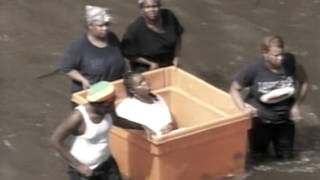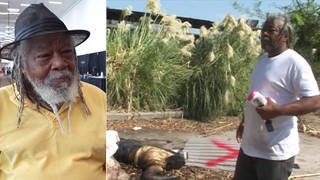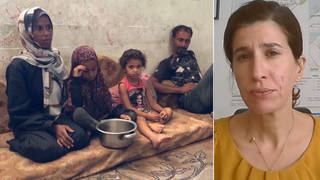
Topics
Guests
- Ahilan KadirgamarSri Lankan Tamil democracy activist and a spokesperson of the Sri Lanka Democracy Forum. He has been active on campaigns to stop human rights abuses by all actors in Sri Lanka.
The decades-long civil war between the predominantly Sinhalese government and Tamil rebels has taken a sharp turn for the worse. A Tamil leader was killed Friday with five of his associates in an air strike by the Sri Lankan military. Analysts suggest this could be the beginning of a return to a full-scale war. We speak to Sri Lankan Tamil democracy activist Ahilan Kadirgamar. [includes rush transcript]
In Sri Lanka, the decades-long civil war between the predominantly Sinhalese government and Tamil rebels from the LTTE, or the Liberation Tigers of Tamil Eelam, has taken a sharp turn for the worse. The political leader of the LTTE, S.P. Tamilselvan, was killed Friday with five of his associates in an air strike by the Sri Lankan military. Analysts suggest this could be the beginning of a return to a full-scale war.
British authorities also arrested Karuna Amman, the leader of a breakaway Tamil paramilitary, on immigration charges Friday. Human Rights Watch called on Britain Saturday to consider trying him for war crimes. Rights experts accuse Karuna of child soldier recruitment and torture both before and after he split from the LTTE.
Senator Patrick Leahy issued a statement Friday expressing concern at abuses by both the LTTE and the Sri Lankan army. He said U.S. aid to the Sri Lankan government was “not a blank check” and urged Congress to support a political and not a military resolution to the conflict. In the past year alone, Sri Lanka has seen over 4,000 people killed, 250,000 internally displaced, and more than a 1,000 civilians “disappeared.”
Ahilan Kadirgamar is a Sri Lankan Tamil democracy activist who has been monitoring and writing about the peace process for several years. He is the spokesperson for the Sri Lanka Democracy Forum.
Ahilan Kadirgamar joins me now in the firehouse studio in New York.
Transcript
AMY GOODMAN: We go quickly to Sri Lanka, where the decades-long civil war between the predominantly Sinhalese government and the Tamil rebels from the LTTE, or the Liberation Tigers of Tamil Eelam, has taken a sharp turn for the worse. The political leader of the LTTE, S.P. Tamilselvan, was killed on Friday with five of his associates in an air strike by the Sri Lankan military. Analysts suggest this could be the beginning of a return to a full-scale war.
We’re joined right now by Ahilan Kadirgamar. He is a Sri Lankan Tamil democracy activist, spokesperson for the Sri Lankan Democracy Forum. Welcome to Democracy Now!
AHILAN KADIRGAMAR: Thank you, Amy.
AMY GOODMAN: In this few minutes we have, explain what’s happening.
AHILAN KADIRGAMAR: Yeah. What we’ve seen over the last few years, since the failure of the Norwegian peace process, is an escalation of the violence. The security situation has deteriorated. There is a very serious human rights crisis in Sri Lanka. And assassinations and killings — there’s a crisis of disappearances — continue unabated.
AMY GOODMAN: The significance of Tamilselvan? Who was he?
AHILAN KADIRGAMAR: He was the political leader of the LTTE, head of the political wing, and he was killed in an air strike last week. But there have been a number of officials both on the government side and LTTE leaders who have been killed. But on the LTTE side, this would be the most senior killing in the last number of years.
AMY GOODMAN: What do you feel has to happen right now?
AHILAN KADIRGAMAR: The most important thing is that there needs to be progress with the political process. There is no military solution to this conflict. Their can only be a political solution. The ball is in the government’s court to come out with credible proposals that address the aspirations and grievances of all minority communities. There is not only the Tamil community; there is also the Muslim community; there are other minorities, such as the — what we call the Up-Country Tamil community. So the state has to deliver on a political solution.
AMY GOODMAN: Do you feel the U.S. has a role in this?
AHILAN KADIRGAMAR: The U.S., along with the international community, has a role, in that the peace process in Sri Lanka is much internationalized. The Sri Lankan situation is very much internationalized. And what we’ve called for is principled engagement from the international community, including the U.S. And by “principled engagement,” we mean that any progress should address human rights and a democratic political solution.
AMY GOODMAN: I want to thank you for being with us for this brief update. Ahilan Kadirgamar, joining us, a Sri Lankan Tamil democracy activist, spokesperson for the Sri Lanka Democracy Forum.












Media Options